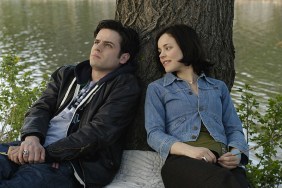Aishwarya Rai as Lalita Bakshi
Martin Henderson as Will Darcy
Daniel Gillies as Mr. Wickham
Naveen Andrews as Balraj Bingley
Namrata Shirodkar as Jaya Bakshi
Indira Varma as Kiran Bingley
Nadira Babbar as Mrs. Bakshi
Anupam Kher as Mr. Bakshi
Meghna Kothari as Maya Bakshi
Peeya Rai Chowdhary as Lucky Bakshi
Nitin Chandra Ganatra as Mr. Kholi
Sonali Kulkarni as Chanda
Ashanti as Herself
Summary:
Gurinder Chadha’s attempt to mix her British and Indian heritages with a Bollywood version of Jane Austen’s classic tale is far too eclectic for its own good. Gorgeous but cheesy as hell.
Story:
Mrs. Bakshi desperately wants to get her four beautiful daughters married off to wealthy men, but her rebellious daughter Lalita (Aishwrya Rai) will only marry for love, putting her into the middle of a conflict between three very different men all trying to woo her. Will Darcy (Martin Henderson) is an American hotel tycoon whose negative view of Indian tradition immediately grates on Lalita’s nerves, but he still seems better suited for her than the lecherous Brit Wickham (Daniel Gilles) and the clueless Kholi (Nitin Ganatra),
Analysis:
India’s Bollywood studio system continues to churn out hugely successful musicals that earn millions of dollars, but making a Bollywood film that appeals to Western sensibilities has proven to be a bit more difficult. Two years ago, The Guru starring Marisa Tomei and Heather Graham, and Hollywood/Bollywood both tried and failed.
Meanwhile, two of the best-known female directors of Indian descent, Gurinder Chadha and Mira Nair, have made Western films that remained true to their roots while appealing to mainstream non-Indian audiences. Chadha’s sports comedy Bend It Like Beckham and Mira Nair’s Monsoon Wedding are two benchmarks in the field, so it’s odd that both of them took a cue from English literature for their most recent movies. Nair essentially discarded her roots for her version of Vanity Fair starring Reese Witherspoon, while Chadha has taken a classic Jane Austen tale originally set in 18th Century England and brings it into a modern-day Indian setting.
It’s no surprise that Austen’s complex romantic wrappings are well suited for the Bollywood treatment. Chadha’s adaptation with regular co-writer Paul Mayeda Berges retains enough of the original names for diehard Austen fans to be happy, but it’s different enough in its approach to be seen as its own entity. Musicals have their own fair share of detractors, maybe because it’s strange when characters break out into song at the drop of a hat. This is the stock and trade of the Bollywood musical, and Bride & Prejudice maintains all the romance, humor and lavish musical numbers that one would expect.
The Eastern flavor of the opening musical number is so wonderful that you’re already ready to accept the idea of a Victorian romance set in modern-day India, when Chadha’s Western influences take over and that’s where things start to go wrong. Pretty soon, the movie is coasting along at a pace not unlike a typical American television show, mixing obvious sitcom-like humor with soppy romance and ineffective attempts at drama.
The Indian-tinged productions are replaced by cheesy Western pop songs with the worst of them being influenced by the sing-a-longs from Grease. The worst example of this is the song “No Life Without a Wife,” where the four sisters sing about a poor choice in suitors. Sure, the song is catchy as hell and you’ll find yourself hitting yourself in the head with a hammer to get it out of there, but the number is so cheesy that I can’t imagine anyone but teen girls really enjoying it. Surely, the songs in From Justin to Kelly were not worse than this. Things only get worse when the family travels to England and Los Angeles, when Chadha slips a bit of Nelly into the soundtrack. The performance by Ashanti serves absolutely no purpose expect to maybe hustle a few soundtracks.
Chadha’s reputation helped her pull together an all-star Bollywood cast, including no less than two former Miss Indias. Already dubbed the “Queen of Bollywood”, the gorgeous Aishwarya Rai is quite wonderful as Lalita, although the writing and story never gives her too much room to stretch as an actress. There are also two terrific comedic performances that make the movie somewhat palatable. First, there’s Nitin Ganatra as Kholi, a completely incompetent Indian from California whose personality falls somewhere between Howie Mandel and Steve Urkel, and Nadira Babbar is hilarious as the girls’ meddlesome mother.
Of the production’s two non-Indians, Martin Henderson, star of last year’s action flop Torque, proves that he has some serious potential as a romantic lead, making the modern-day Darcy one of the few aspects of the movie that works. At least, he does a better job with the character than Daniel Gillies, who turns the lawyer Wickham into a surfing slacker with a penchant for underage Indian girls. As the film’s main antagonist, he has to come across as a bit sleezy, but why an intelligent woman like Lalita might have interest in him over Henderson’s Darcy makes little sense. Even so, there’s rarely any doubt how this love triangle will turn out, regardless of how hard Chadha tries to make us think otherwise.
Bride & Prejudice wouldn’t be so bad if Austen’s story were actually able to hold up to being dragged through this cultural melting pot, but it tries too hard to be hip, modern and light-hearted for its own good. It ends up seeming forced and contrived. It’s a shame, because under it all, Chadha’s subtle message about the differences between traditional Indians and those of the Western variety is worthwhile, but the only thing you end up coming away with is that the two shouldn’t mix.
The Bottom Line:
Chadha’s attempt to mix East and West with Bride & Prejudice just doesn’t work. It ends up being little more than a corny and often ridiculous musical comedy geared towards teen girls and those who adored Grease, which apparently is a lot of people.
Bride & Prejudice opens in New York and Los Angeles on Friday; it expands nationwide on February 24.










